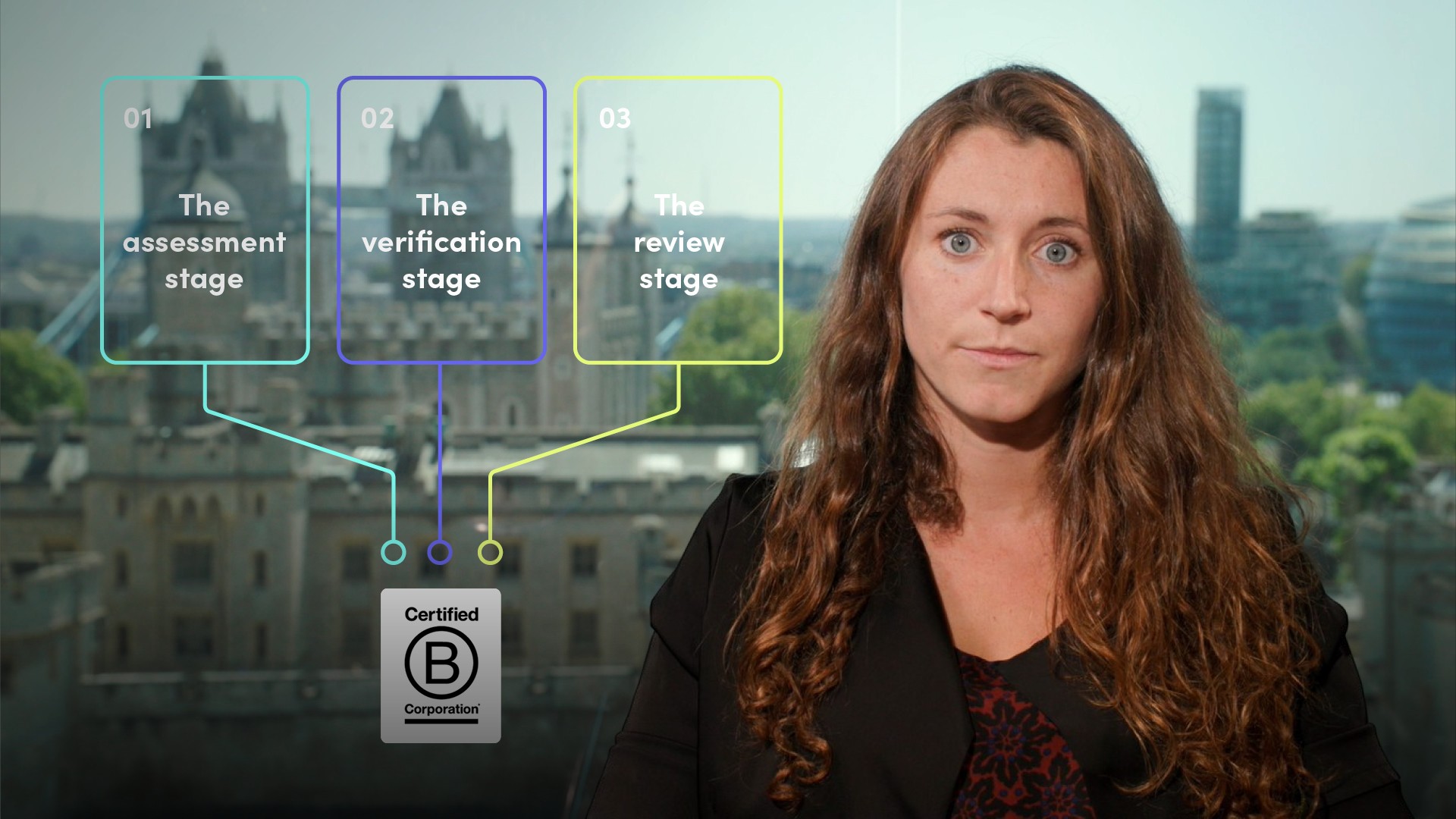
How to Become a B Corp?

Rebecca Wetten
B-Corps and sustainability specialist
In this video, Rebecca gives an overview of the application process involved in becoming a B Corp. She outlines the timelines to expect, the resources needed, giving you the tools to evaluate whether the process is worth the resources needed to apply.

In this video, Rebecca gives an overview of the application process involved in becoming a B Corp. She outlines the timelines to expect, the resources needed, giving you the tools to evaluate whether the process is worth the resources needed to apply.
Subscribe to watch
Access this and all of the content on our platform by signing up for a 7-day free trial.

How to Become a B Corp?
10 mins 57 secs
Key learning objectives:
Identify the three stages in acquiring B Corp status
Explain in detail what each of these stages involve
Highlight what happens after passing all three stages
Overview:
There is a rigorous and time consuming application process for B corp. This process covers all the way from the business practices right down to how the company treats their employees. However, the B Corp label boosts a company’s reputation, is attractive to talent, and gives access to a community of sustainable companies - the certification is arguably worth it.
Subscribe to watch
Access this and all of the content on our platform by signing up for a 7-day free trial.
The path to certification involves which three stages?
- Assessment Stage
- Verification Stage
- Review Stage
It can typically take anywhere between six months to a year to become a certified B Corp.
What does the Assessment stage involve?
The B Impact Assessment (BIA) kicks off the assessment stage. The BIA is a free, online questionnaire that aims to measure the overall impact of a company on all of its stakeholders. The BIA asks questions about how the day-to-day operations of a company create a positive impact for the company’s workers, community and environment. There will be between 100 to 200 multiple choice questions and the number of questions varies depending on the size and complexity of your company.
What sort of questions can companies expect to be asked in this stage?
- Governance: the structures in place to run your company, such as accountability & transparency - E.g. What portion of your management is evaluated on their performance with regard to corporate social and environmental targets?
- Workers: how your company deals with employees, from the compensation you provide to the work environment. E.g. What is the minimum number of vacation days / sick days / personal days / holidays offered annually to full-time tenured workers?
- Community: how does your company interact with your local area, from your suppliers to job creation opportunities? E.g. What percentage of your permanent employees are from chronically underemployed populations and participate in the above workforce development program?
- Environment: your sustainability credentials, from your office to your outputs. E.g. What % of energy used is from renewable on-site energy production for corporate facilities?
For most companies, the assessment takes between 1-3 hours depending on its size, age & complexity.
What does the Verification Stage involve?
After completing the BIA, this information is passed on to the B Lab team. The B Lab team will then calculate your score by rigorously analysing and verifying the long-term validity of your claims to determine if your company meets the 80-point bar for certification.
What could companies do to make the process smoother?
- Ensure you have the supporting documentation to verify claims you’ve made in the BIA
- You’ll also be required to fill out some standardised forms, where you answer more questions about areas such as your revenue streams, suppliers etc
- Gathering together the documentation can be time consuming and complex, so be prepared to invest time and resources at this stage of the process
What score in your B Impact Report will grant you past this stage?
Your B Impact Report will break down your scores across the different categories of governance, workers, community & environment, providing you with an overall score. If you meet the 80 point threshold, your company will progress to the review stage.
What does the Review Stage involve?
If your company is still above 80 points at the review stage, you will be assigned a standards analyst. More verification documents may be required at this stage. During the hour-long verification phone call with your standards analyst, you’ll be asked questions to reveal more detail or clarity on areas of your application.
If your company gets to the review stage of the application process and has a score of 80+, you’re a certified B Corp. If your company got to this stage and dipped below the 80 points, there is a grace period to try to improve your score.
After passing all stages, what happens next?
You then get sent your B Corp Declaration of Interdependence, a list of principles to incorporate into your legal framework: these include being a purpose-driven organisation, being the change you want to see in the world and doing no harm.
This is where you’ll be required to pay your annual certification fee, which will depend on your annual sales figures. For example, if your annual sales are up to £149,000, you’ll pay a fee of £500. If you have a turnover of £1bn, you’re looking at a fee of upwards of £50,000. Re-assessment is required after two years, and any company can fill out the online BIA anytime.
Subscribe to watch
Access this and all of the content on our platform by signing up for a 7-day free trial.

Rebecca Wetten
There are no available Videos from "Rebecca Wetten"


























